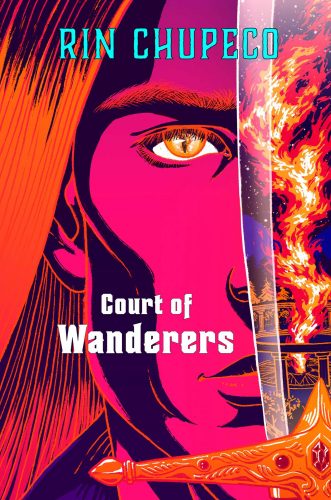 Court of Wanderers (Silver Under Nightfall, #2) by Rin Chupeco
Court of Wanderers (Silver Under Nightfall, #2) by Rin Chupeco Format: eARC
Source: supplied by publisher via Edelweiss
Formats available: hardcover, ebook, audiobook
Genres: Dark Fantasy, epic fantasy, fantasy, fantasy romance, Gothic, horror, steampunk, vampires
Series: Reaper #2
Pages: 448
Published by Gallery / Saga Press on April 2, 2024
Purchasing Info: Author's Website, Publisher's Website, Amazon, Barnes & Noble, Kobo, Bookshop.org, Better World Books
Goodreads
Remy Pendergast and his royal vampire companions return to face an enemy that is terrifyingly close to home in Rin Chupeco’s queer, bloody Gothic epic fantasy series for fans of Samantha Shannon’s The Priory of the Orange Tree and the adult animated series Castlevania.
Remy Pendergast, the vampire hunter, and his unexpected companions, Lord Zidan Malekh and Lady Xiaodan Song, are on the road through the kingdom of Aluria again after a hard-won first battle against the formidable Night Empress, who threatens to undo a fragile peace between humans and vampires. Xiaodan, severely injured, has lost her powers to vanquish the enemy’s new super breed of vampire, but if the trio can make it to Fata Morgana, the seat of Malehk’s court—dubbed “the Court of Wanderers”—there is hope of nursing her and bringing them back.
En-route to the Third Court, Remy crosses paths with his father, the arrogant, oftentimes cruel Lord of Valenbonne. He also begins to suffer strange dreams of the Night Empress, whom he has long suspected to be Ligaya Pendergast, his own mother. As his family history unfolds during these episodes, which are too realistic to be coincidence, he realizes that she is no ordinary vampire—and that he may end up having to choose between the respective legacies of his parents.
Posing as Malek and Xiaodan’s human familiar, Remy contends with Aluria’s intimidating vampire courts and a series of gruesome murders with their help—and more, as the three navigate their relationship. But those feelings and even their extraordinary collective strength will be put to the test as each of them unleashes new powers in combat at what may be proven to be the ultimate cost.
My Review:
I loved this second book in the Reaper duology even more than I loved the first book, Silver Under Nightfall. Which means that it is going to be damn near impossible to keep my SQUEE under enough control to write this review.
But then again, I loved this so hard that I have literally nothing truly serious to say, except to tell people to go out and read this duology and to start with Silver Under Nightfall and be prepared to forgo sleep until you’ve finished the set.
The story in Court of Wanderers picks up right after the ending of Silver Under Nightfall, and everything that happened in that first book is part of the setup for this second. So my one very serious thing to say is to start with Silver Under Nightfall to get acclimated to this intricately designed and convoluted world where the good humans are working with the good vampires, the bad vampires are killing the bad humans and someone or something is maneuvering behind the scenes on both sides for dastardly reasons of their own.
Because divide and conquer has been a sound strategy since the dawn of, well, strategy.
At the heart of this truly epic dark fantasy are Malekh, Xiodan and especially Remy. Malekh and Xiodan are vampires at the center of seemingly ALL the power plays among their people. A people who are distrustful of each other and seem to hold humans in contempt. But are forced to or hopeful of or a bit of both regarding an alliance with at least some humans in order to fight a common enemy that is targeting them both with armies of infectious, unkillable monsters.
(And yes, anything that a vampire thinks is a monster is pretty damn monstrous – as are the people (for loose definitions of ‘people’) controlling them.)
Remy Pendergast, the point of view character for the story, is a garden-variety human. Or so he believes, in spite of all the rumors to the contrary he grew up with and was constantly reviled for. His father leads the human armies on behalf of the Alurian Queen Ophelia.
His father, quite frankly, is also a bastard – the marital status of HIS parents notwithstanding.
Remy was supposed to be his father’s spy among the vampire courts. Instead, Remy has found the first place he could ever call home. A place where he is respected, appreciated, and most definitely loved. By Malekh and Xiodan, the leaders of the third and fourth vampire courts, who want to make him their acknowledged third, whether he remains human or lets himself be turned.
But Remy isn’t quite the mere human that he believed himself to. Then again, quite a few of the things he believed and the people he believed in are not exactly what he believed them to be, either.
The war that Remy is at the forefront of, on both sides at the same time, will test his courage, his mettle, his resolve – and most especially, his heart.
What comes out the other side – intact or otherwise – is for Remy to discover. If he survives – and if his world survives with or without him.
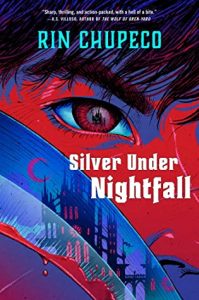 Escape Rating A++: The SQUEE is strong with this review. Let’s get into at least a bit of the why of that fact.
Escape Rating A++: The SQUEE is strong with this review. Let’s get into at least a bit of the why of that fact.
The comparison that keeps being made in the blurbs is to Castlevania. I’ve never played the game, so I can’t say if that’s on point or not. What is very much on point – and not just the pointy fangs of the vampires themselves, is that the Reaper duology does a fantastic – no pun intended – job of combining the battle of good vs. evil that so often lies at the heart of epic fantasy with epic fantasy’s complex worldbuilding AND its underlying thread of very long, downright historical forces teeing up to fight the same battles over and over again.
At the same time, and I think this is where the Castlevania reference comes in, some of the prime movers and shakers in this world are vampires. And it has been observed, at least by this reader, that vampire politics tend to run towards exceedingly long games and even longer grudges because those original movers and shakers are still doing the moving and the shaking down through the millennia. It’s difficult to get a fresh start when the people who need it are battling not against institutional memory or country-founding ethos but against actual memory – usually in worlds where therapy is not remotely a thing.
A big part of what is ultimately uncovered, the evil at the heart of this world, is that the forces arrayed have been maneuvering on the down low for longer than the short-lived humans could possibly imagine – not that plenty of them haven’t either been caught up in it or killed by it or both over the centuries.
Our point of view on those discoveries, and on those centuries of underhanded and underground dealings, is Remy Pendergast. In Silver Under Nightfall, we’re with Remy as he’s used and abused by everyone around him in the human world, and we follow his perspective as he learns that the vampire courts are not much like he’s always been taught. And that he has considerably more value as a person than the human courts – particularly his own father – have ever led him to believe.
As Court of Wanderers begins to unravel the plots and counterplots that have set up the epic confrontation, Remy learns that so much of what he’s been taught to believe just ain’t so. We feel for him as his illusions are destroyed, as some of them get rebuilt, and as the layers of the whole onion of his life peel back with tears every step of the way. We get caught up in his journey as well as the battle yet to come and its multiple horns of dilemma consequences.
I got caught up in this story for Remy, because it was impossible not to feel for him, and because the way that his continual discoveries of how the world REALLY works as opposed to how he thought it did gave me a captivating and compelling ‘in’ to this complex world.
I stuck around because as the romance – and it is absolutely a romance – between Malekh, Xiodan and Remy gets deeper I found myself feeling for them, both in the romance AND for the centuries of trauma they had experienced and the way that their world was damaged and how desperately they wanted to fix it in spite of the forces arrayed against them.
I was fascinated with the way that the good vs. evil battle that has been fought through the whole story wasn’t reduced in any way to the easy fixes. Although many people at the beginning believed it was vampires vs. humans, and the villains were trying hard to make that point stick, in the end there was good among both and evil among both and deception on all sides. And redemption as well.
When I closed the final page of Court of Wanderers, I left this world with a deeply conflicted reaction. The ending of this book, and this duology, is utterly right for the story that was told within. The mix of the bitter of loss with the sweet of possibilities was, in the immortal words of Goldilocks, ‘just right’. But I’m deeply sad that this marvelous story is over, and that I won’t get to see the outcome of the life-altering choices that Remy has before him – and I desperately want to know.
Maybe I’ll find out in some future story by this author. I hope so. I KNOW that I’ll be all in on their next adult fantasy, whenever it appears, because Silver Under Nightfall and Court of Wanderers constitute a tale that I’m going to remember for a long, long time.

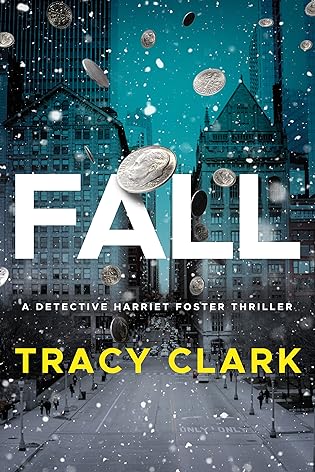 Fall (Detective Harriet Foster #2) by
Fall (Detective Harriet Foster #2) by 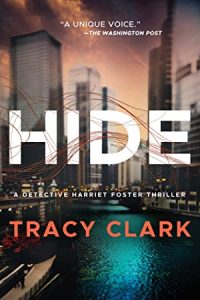 Escape Rating A++: I finished this at 3 in the morning because I simply could not put it down. I mean, I tried, but I just couldn’t let this one go until the end. An ending like black coffee, tasty but bitter, with a solid kick at the finish.
Escape Rating A++: I finished this at 3 in the morning because I simply could not put it down. I mean, I tried, but I just couldn’t let this one go until the end. An ending like black coffee, tasty but bitter, with a solid kick at the finish. Anytime that a story keeps me up until 3 in the morning, I want more than I have. Not more of this particular book, because it was the right story at the right length at the right time, but more like this or more of these characters or both. Definitely both.
Anytime that a story keeps me up until 3 in the morning, I want more than I have. Not more of this particular book, because it was the right story at the right length at the right time, but more like this or more of these characters or both. Definitely both.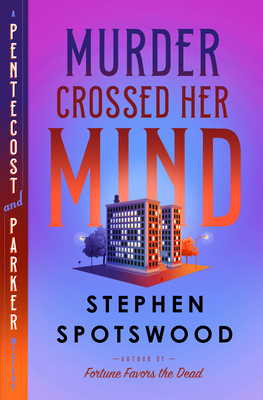 Murder Crossed Her Mind (Pentecost and Parker #4) by
Murder Crossed Her Mind (Pentecost and Parker #4) by 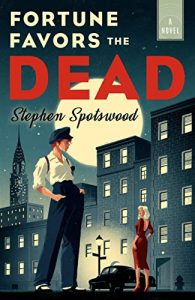 It’s still 1947 in this fourth entry in the
It’s still 1947 in this fourth entry in the 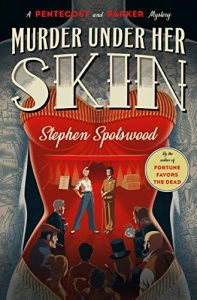 Escape Rating A++: Murder Crossed Her Mind was an actual, literally, honest-to-goodness one sitting read for me. I started it thinking I’d read for an hour or so before bed, and then just stayed there reading. And stayed. And STAYED. Until it was done nearly four hours later. Hence that A++ rating because I simply could not put this down until Pentecost and Parker knew everything and staged a great – but still slightly speculative – reveal at the end.
Escape Rating A++: Murder Crossed Her Mind was an actual, literally, honest-to-goodness one sitting read for me. I started it thinking I’d read for an hour or so before bed, and then just stayed there reading. And stayed. And STAYED. Until it was done nearly four hours later. Hence that A++ rating because I simply could not put this down until Pentecost and Parker knew everything and staged a great – but still slightly speculative – reveal at the end.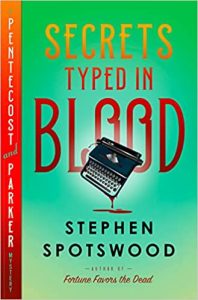 It was also a bit different because it was never about what enemies Vera might have made – because she didn’t. Instead, it was about which secret someone could least afford her to reveal, which made the investigation just that much more complicated.
It was also a bit different because it was never about what enemies Vera might have made – because she didn’t. Instead, it was about which secret someone could least afford her to reveal, which made the investigation just that much more complicated.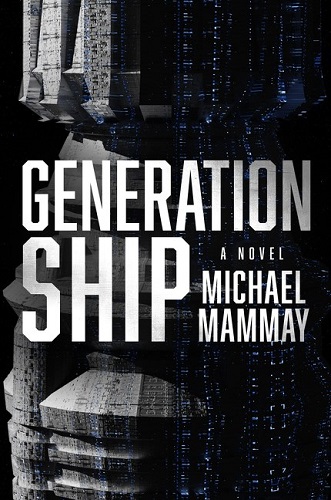 Generation Ship by
Generation Ship by 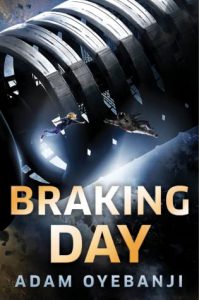 By seeing the situation from so many sides we’re able to get inside the life of the ship, AND the life on the ship, which are not nearly as much the same things as everyone believes. We’re watching a world come apart – even if that’s what was always supposed to happen. And it’s utterly fascinating as the players negotiate and maneuver themselves into a situation that is nothing like the first crew expected.
By seeing the situation from so many sides we’re able to get inside the life of the ship, AND the life on the ship, which are not nearly as much the same things as everyone believes. We’re watching a world come apart – even if that’s what was always supposed to happen. And it’s utterly fascinating as the players negotiate and maneuver themselves into a situation that is nothing like the first crew expected.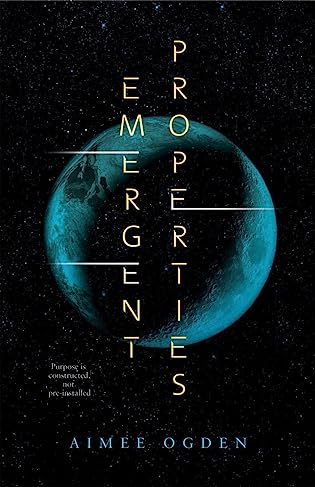 Emergent Properties by
Emergent Properties by 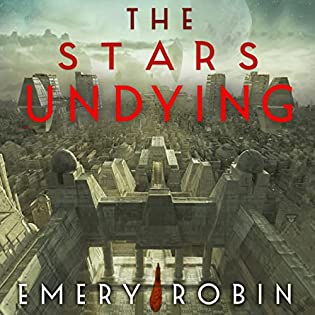 The Stars Undying (Empire Without End, #1) by
The Stars Undying (Empire Without End, #1) by 
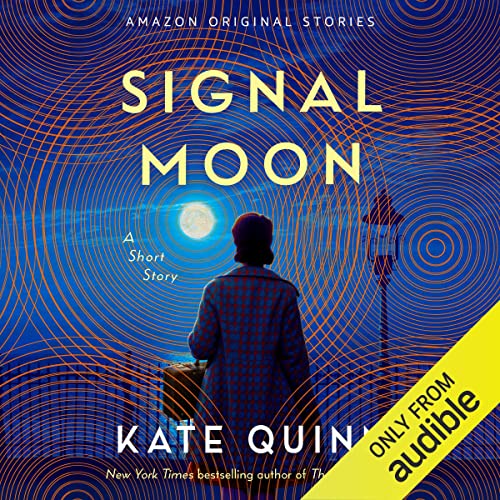 Signal Moon: A Short Story by
Signal Moon: A Short Story by 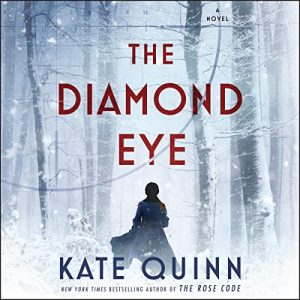 While Matt’s more frank and frequently profane dialog, along with the desperation of his own internal monologue, gives the reader or listener a clear portrait of who he is and what drove him to become the person – and the officer – that he is on the brink of what could be – briefly – his very own war.
While Matt’s more frank and frequently profane dialog, along with the desperation of his own internal monologue, gives the reader or listener a clear portrait of who he is and what drove him to become the person – and the officer – that he is on the brink of what could be – briefly – his very own war.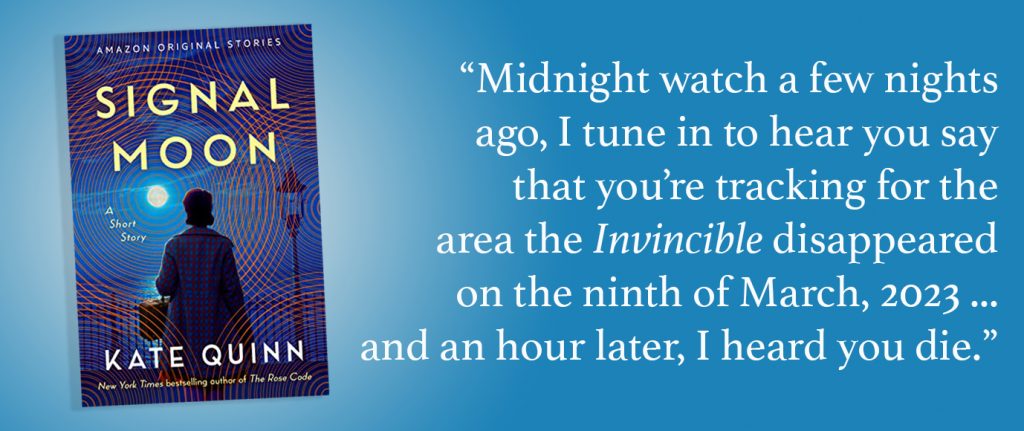
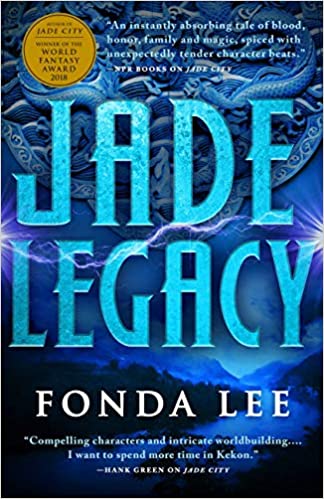 Jade Legacy (The Green Bone Saga, #3) by
Jade Legacy (The Green Bone Saga, #3) by 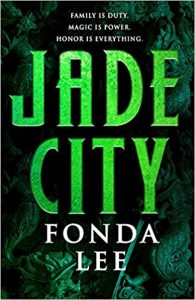 The story that began in
The story that began in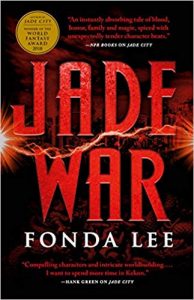 Escape Rating A++: This book, and this entire series, deserve all the stars. I picked this to be the last review of the year because I wanted to finish this year’s reading with a real bang of a winner, and Jade Legacy delivered all the highs and lows I could possibly have ever wanted.
Escape Rating A++: This book, and this entire series, deserve all the stars. I picked this to be the last review of the year because I wanted to finish this year’s reading with a real bang of a winner, and Jade Legacy delivered all the highs and lows I could possibly have ever wanted.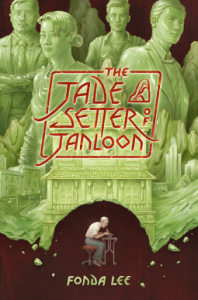 Watching them rise, and fall, and rise again is a journey very worth taking. If you have not yet had the pleasure, start with Jade City and be prepared for a wild, satisfying and heartbreaking ride. I envy you the journey.
Watching them rise, and fall, and rise again is a journey very worth taking. If you have not yet had the pleasure, start with Jade City and be prepared for a wild, satisfying and heartbreaking ride. I envy you the journey.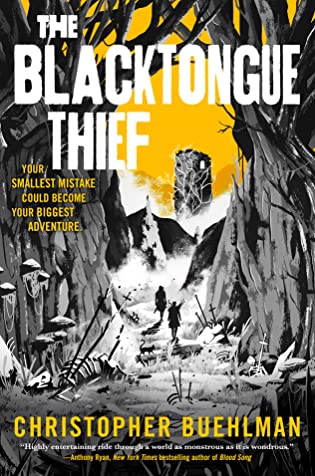 The Blacktongue Thief (Blacktongue, #1) by
The Blacktongue Thief (Blacktongue, #1) by 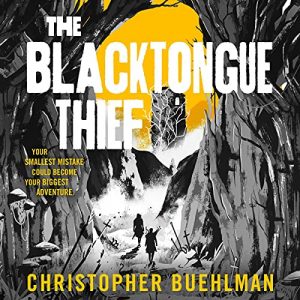
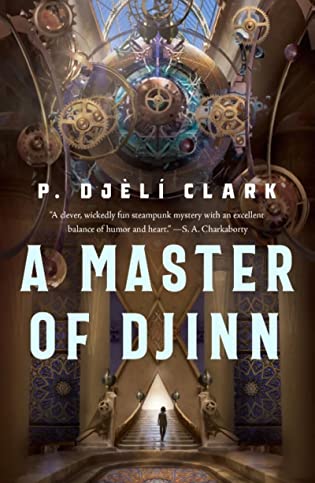 A Master of Djinn by
A Master of Djinn by 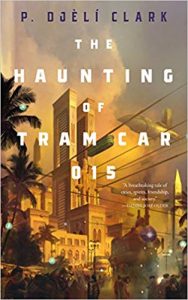 Escape Rating A++: Honestly, I want to just sit here and squee. A lot. This was amazingly awesome from beginning to end and I don’t say that lightly. This is one of those stories that made me think pretty much all the thoughts and I’m still reeling a bit from the absolutely epic book hangover.
Escape Rating A++: Honestly, I want to just sit here and squee. A lot. This was amazingly awesome from beginning to end and I don’t say that lightly. This is one of those stories that made me think pretty much all the thoughts and I’m still reeling a bit from the absolutely epic book hangover.